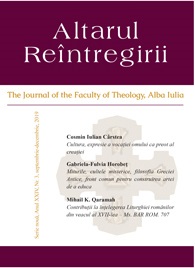Miturile, cultele misterice, filosofia Greciei Antice, front comun pentru construirea artei de a educa
The Greek myth, the divine Greek mystical rituals and Greek Philosophy, common front for building the art of educating
Author(s): Gabriela Fulvia HorobețSubject(s): Theology and Religion, Comparative Studies of Religion
Published by: Facultatea de Teologie Ortodoxă Alba Iulia
Keywords: athenian education; Homeric hero; harmony unit; typical values;Ideas;
Summary/Abstract: Originality, dynamism and elitism are the features that characterize the ancient Greece. Even the political and administrative domains point to this competitive characteristic aimed at overcoming challenges that will generate the best opportunities and solutions for Greece to achieve its most potential in those times. Thus, Greece evolves as a federation of states always racing to be the best at everything be it cultural, political, philosophical, scientific, economic, sports domains in order to ensure their country’s prestige. The religious dimension had a huge influence on Education that was cherished by the ancient Greeks. Myth and artistic instruction mutually influenced themselves, moreover, he training bettered, ennobled the mythological heroes and heroines humanizing them. Athenian education was the standard training model in all Greece and aimed at a noble life that of aristocrats who could permanently relate to the mythological high standards of legendaryGods found in the pre-classic age. In Greek society Education for men mainly targeted virility mixed with wisdom inspired by Homer’s ideal masculine type of hero who fitted the profile. The feminine archetype in the noble courts was essentially characterized by refined beauty due to the cultural model of distinguished manners, gentleness, sensitivity based on the chivalrous ideal woman always promoted in those times and the middle ages.
Journal: Altarul Reîntregirii
- Issue Year: XXIV/2019
- Issue No: 3
- Page Range: 79-89
- Page Count: 11
- Language: Romanian

